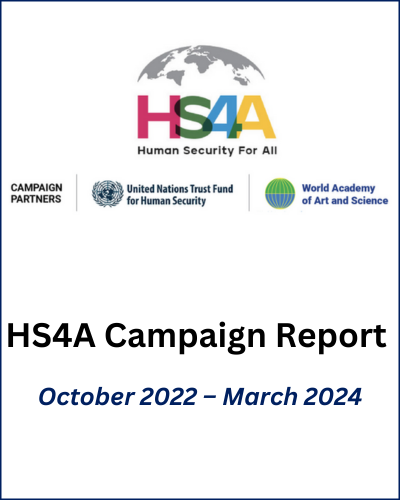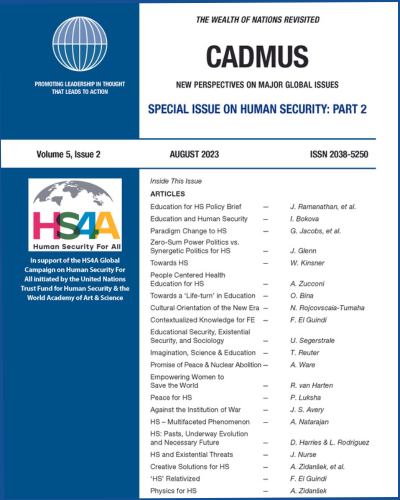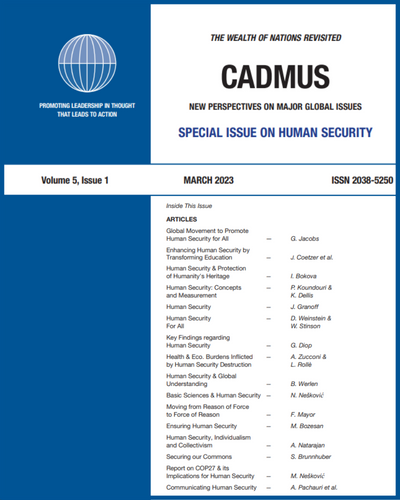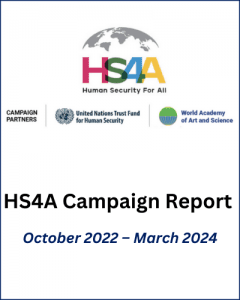 Human Security addresses all the critical issues confronting the world today, including peace, human rights, inequality, health, food, education, jobs, safe communities and personal safety, energy, pollution, biodiversity and, of course, climate change. It’s a flag that supports all 17 UN Sustainable Development Goals which 193 countries have already approved and rallied around. But it speaks of these things in a personal language which everyone can identify with. It’s a message that can rally widespread support for the commitments already made by national governments, UN agencies, communities, corporations, NGOs, religious groups and others to make the world a better, safer place for everyone. Read more on the campaign here.
Human Security addresses all the critical issues confronting the world today, including peace, human rights, inequality, health, food, education, jobs, safe communities and personal safety, energy, pollution, biodiversity and, of course, climate change. It’s a flag that supports all 17 UN Sustainable Development Goals which 193 countries have already approved and rallied around. But it speaks of these things in a personal language which everyone can identify with. It’s a message that can rally widespread support for the commitments already made by national governments, UN agencies, communities, corporations, NGOs, religious groups and others to make the world a better, safer place for everyone. Read more on the campaign here.
Global Peace Offensive project launch
The Global Peace Offensive is a new initiative launched by WAAS in collaboration with the European Academy of Science in recognition of the unprecedented threats to peace and human security confronting humanity today and the inadequacy of traditional diplomacy initiatives to reverse the contagion of insecurity, violence and war spreading around the globe. It transcends traditional conflict management and embraces comprehensive, inclusive efforts to transform crises into opportunities for enduring peace. Such an offensive, underpinned by strategic unilateral actions and a commitment to building trust, can break the cycle of violence and pave the way for a more stable and cooperative international order. The objective of the Peace Offensive is to promote positive momentum on peace and human security by innovative strategic initiatives that present a viable pathways for resolving protracted crises at the local, regional and global level. This project is founded on the premise that there is scope for positive initiative when parties to conflict recognize the legitimacy of reciprocal initiatives for compromise. It calls for unilateral, symbolic gestures to encourage reciprocal actions in response. It aims to transform adversarial dynamics into collaborative relationships, even amidst the most entrenched conflicts. It focuses on the potential for Graduated Reciprocation in Tension Reduction as a mechanism for de-escalating hostilities. Click here to Read More
Security can no longer be solely concerned with national or military security. It must encompass all aspects of human wellbeing – health, food, employment, living standards, education, public confidence and social tolerance. Human Security is a broad conceptual approach applicable to all areas of development policy. Such an integrated approach can accelerate positive action to address threats such as pandemics and climate change, to coordinate and accelerate the implementation of the SDGs, and to enhance multilateral cooperation.
What is Human Security?
“Human security is a process that can and should be applied to enhance implementation of all socially-endorsed goals related to human rights and human development.”
Human Security is all about placing humans at the center of development. It is a unifying theme and force that serves as a core frame of reference to enhance the effectiveness of a wide range of high priority social objectives. Human Security must be established as a universal benchmark for effective development strategies in future.
Events
CES 2025

Safeguarding the Human Experience Through Technology | Technology’s Critical Role in Human Security. Human security recognizes the experiences of personal wellbeing and inclusiveness across eight security pillars tied to an individual’s experience in life. Tech is becoming ever more essential as a tool in facilitating positive change and innovation across the eight pillars.
Webinar on Global Peace Offensive
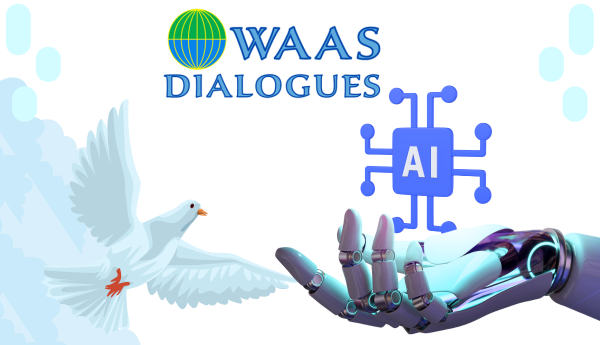
WAAS and EASA held Peace Offensive webinar on 21 October, the event encouraged innovative thinking to prevent and resolve conflicts. Experts discussed AI’s potential in fostering global peace and the critical role of education in ensuring long-term security.
Webinar on Sustainable Futures

This WAAS webinar aims to introduce out-of-the-box thinking on significant contemporary opportunities and threats that could lead to action towards exciting alternative futures encompassing sustainability, high quality of life and human security for all.
Parliamentarians and Human Security
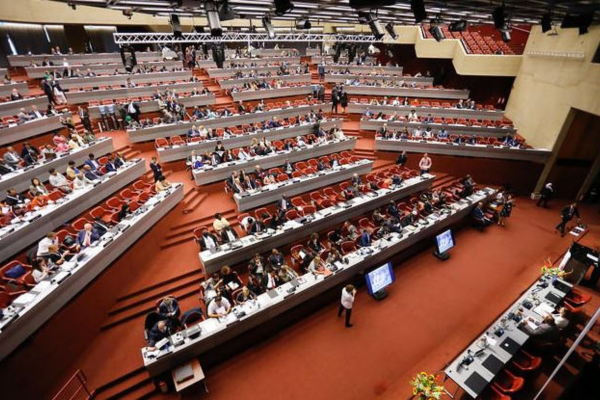
The 148th Assembly of the IPU in Geneva from March 23-27, 2024, addressed parliamentary diplomacy, adopted resolutions on autonomous weapons’ impact and climate action partnerships, and included a session by the Committee on the Human Rights of Parliamentarians.
WAAS Talks : Science for Human Security

Introduction In August 2023, the United Nations (UN) General Assembly proclaimed the International Decade of Sciences for Sustainable Development, from 2024 to 2031. The task to lead the preparation and implementation of the activities within the Decade was given to UNESCO.
CES 2024: Safeguarding the Human Experience Through Technology

The Human Security for All (HS4A) campaign returned to CES 2024 in Las Vegas — the world’s largest technology event, with more than 140,000 tech leaders from around the world.
The world’s technology leaders converged in Las Vegas from 9-12 January 2024 to share the latest advancements across the tech ecosystem. HS4A hosted “Great Minds” sessions and “CES Research Summit” session featuring WAAS Fellows.
CES choses Human Security as its Theme

Launching on 5th January 2023, CES 2023 is the largest technology show in the world. It has partnered with the WAAS to showcase the critical role of technology in support of the United Nations efforts to advance human security around the world. For CES 2023, CTA introduced a new category of Innovation Awards showcasing technologies advancing human rights. The Human Security for All category includes eight new tech subcategories.
Global Campaign on Human Security for All
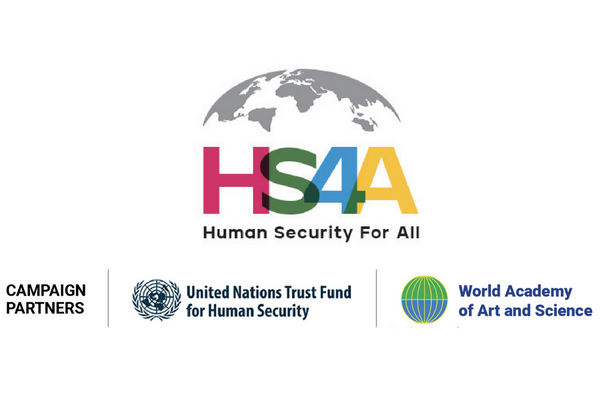
In October 2022, WAAS began a formal collaboration with the United Nations Trust Fund for Human Security (UNTFHS) on a global campaign to promote Human Security for All (HS4A). Since March 2024, WAAS has continued this campaign, that promotes a comprehensive, integrated approach to security that encompasses all the dimensions of the 17 SDGs, including peace and human rights.
Human Security: Its Time Has Come
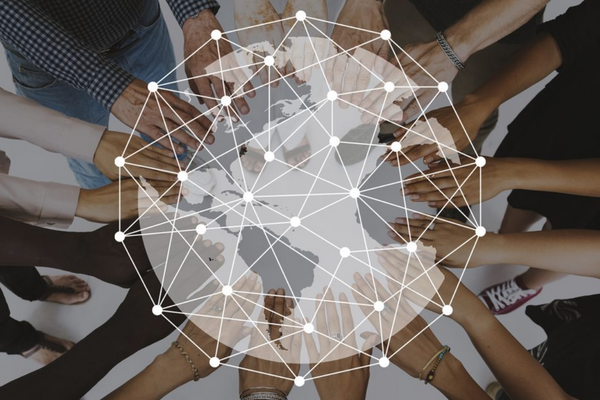
Jonathan Granoff, President of the Global Security Institute, addresses the Rotary E-Club of World Peace on June 14, 2022. “Ask yourself every day: Is my love alive, true, generous, and open? How can I bring love into action?’ He asks. The Rotary E-club is an active community of peacebuilders learning about and advancing peace.
Children’s Artistic Perspectives on Human Security
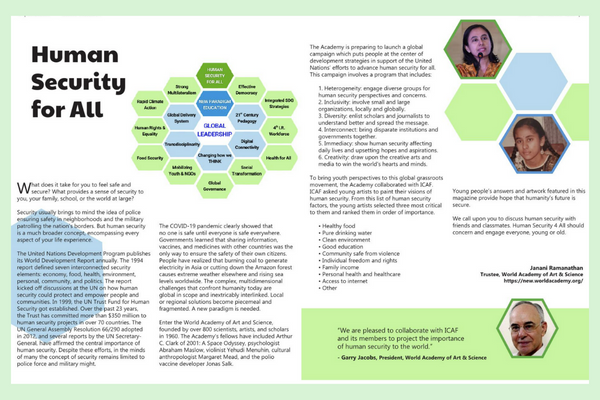
International Child Art Foundation (ICAF) in an arts organization for children that aims to bring about positive change worldwide. The September issue of its magazine Child Art, featured children’s perspectives on human security. Children painted in words and through artwork their thoughts on what makes them feel most secure.
Human Security: Practical, Urgent, and Necessary
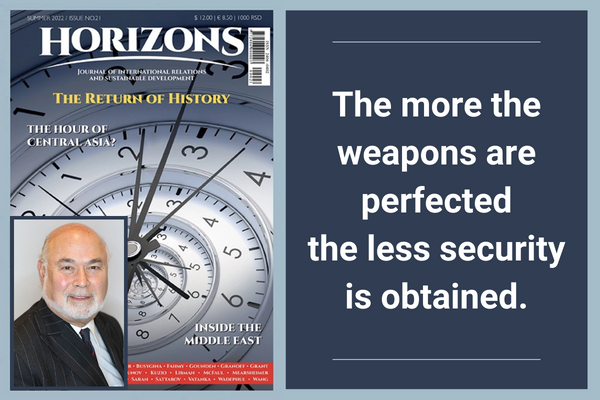
Human security is the necessary framework for preventing pandemics, protecting the climate, rainforests, the health of the oceans, water, and topsoil, stopping the destruction of species and impairing the web of life we call biodiversity. Focusing security primarily on people is what is needed to eliminate the existential threat posed by nuclear weapons.
Trauma Informed Care
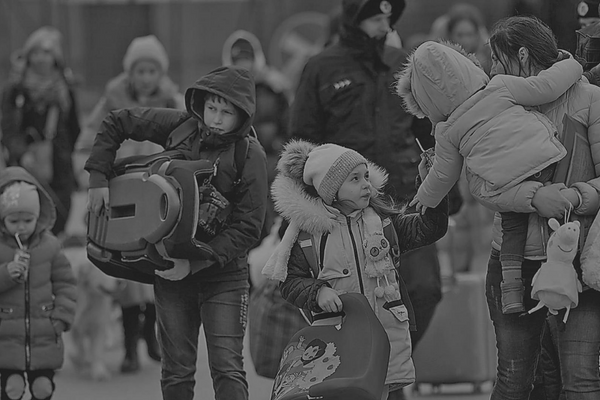
Mental health workers and doctors report that thousands of Ukrainian refugee children displaced by war are showing severe symptoms of psychological trauma. Trauma Informed Care project addresses this inter-generational global public health crisis.
Human Security & Multilateralism
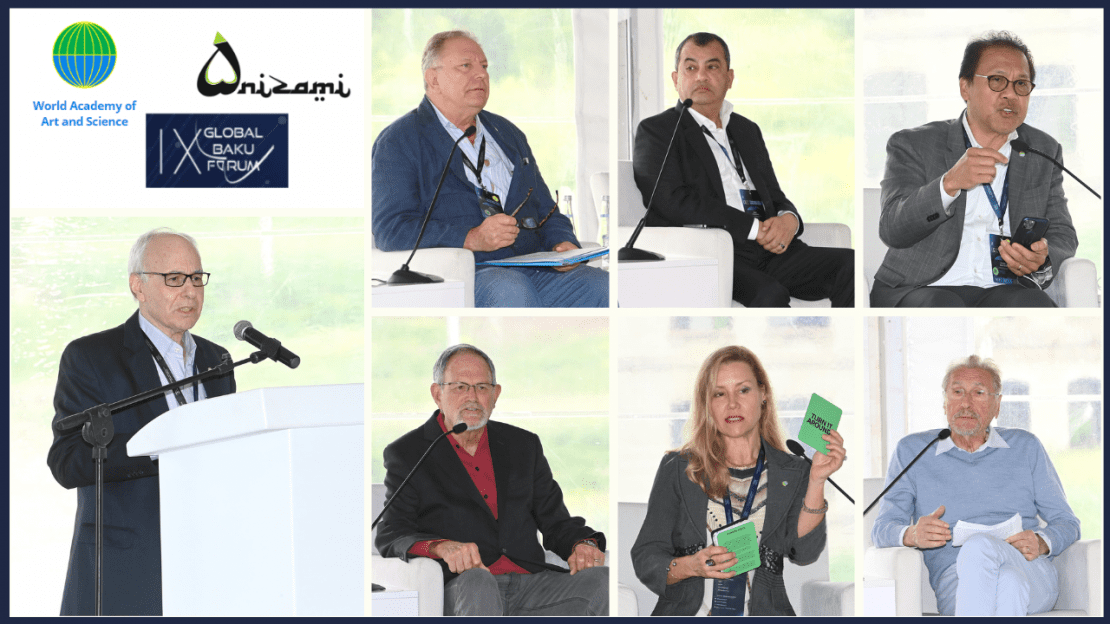
WAAS conducted a special session “Human Security & Multilateralism: Formula for Global Leadership” on June 19th announcing the HS4A campaign to a distinguished audience of political, diplomatic, social and thought leaders at the Global Baku Forum organized by NGIC.
Realistic Human Security
World-renowned conservationist Jane Goodall and global security expert Jonathan Granoff discussed the role of individuals and states in obtaining Human Security at the Oxford Union Society.
Human Security and a Culture of Peace
This session during the 5th Future Education Conference explored the UN concept of Human Security which is designed to provide a comprehensive, integrated framework for understanding and effective action at the local, national and global level.
HS4A Report
Published Articles
Other Recent News on Human Security
NATO embraced a considered and comprehensive approach to human security
In 2022 NATO embraced a considered and comprehensive approach to human security. Intended as a complement and augmentation of NATO’s traditional focus on conflict through military means, this new paradigm signaled a values-based approach to addressing security challenges facing the Alliance. NATO describes it as a “a multi-sectoral approach to security that gives primacy to people.” Implementing the change, however, has been the hard part; the challenge for NATO has been to transform promises and policy pronouncements into real behavioral changes in doctrine and military conduct.
CES 2023 Collaborates with WAAS on Human Security
Consumer Technology Association, CTA, convened a press conference making Human Security the official theme of the CES 2023 held in Las Vegas on January 5-8, 2023.
Political Support and Inclusive Responses to Sustainable Recovery
Parliamentarians for Nuclear Nonproliferation and Disarmament (PNND) Intervention at the Parliamentary Hearing at the United Nations General Assembly Hall, New York City.
Inter-Parliamentary Union webinar on nuclear disarmament and human security
The Inter-Parliamentary Union, Parliamentarians for Nuclear Non-proliferation and Disarmament (PNND), the Geneva Centre for Security Policy (GCSP) and the World Future Council (WFC) organized a webinar on Parliamentary action to reduce nuclear risks and advance nuclear disarmament.
UNDP Report on Threats to Human Security, Feb 2022
New data and analysis in the report, New Threats to Human Security in the Anthropocene, shows that people’s sense of safety and security is at a low in almost every country, including the richest countries, despite years of upwards development success.

